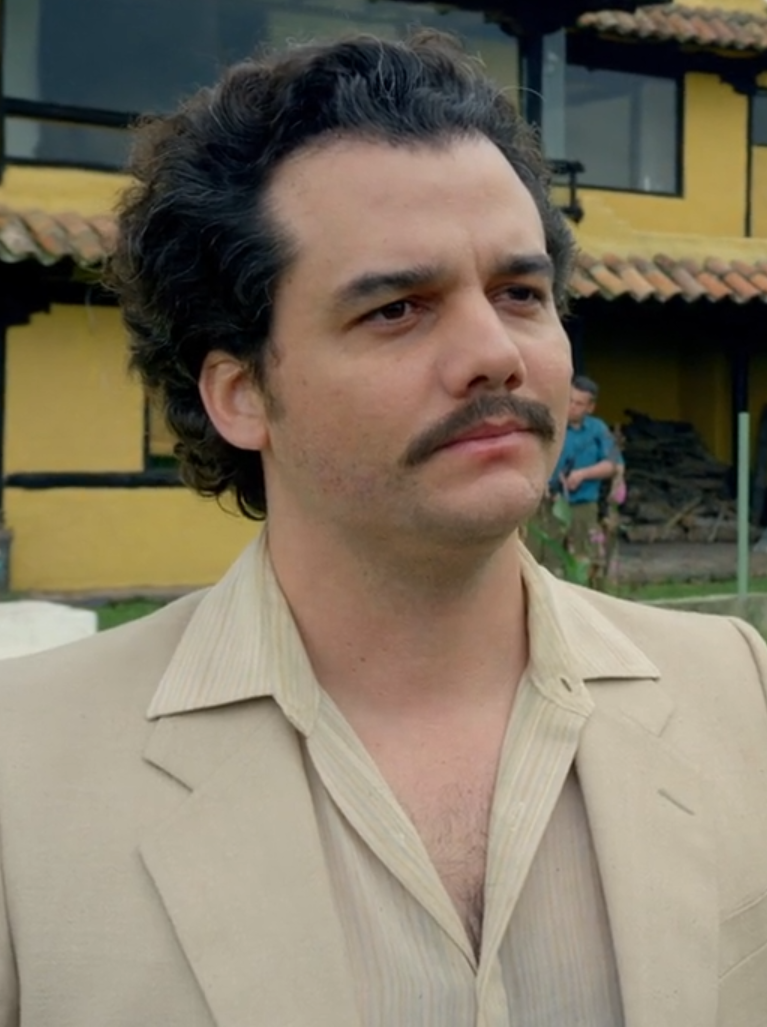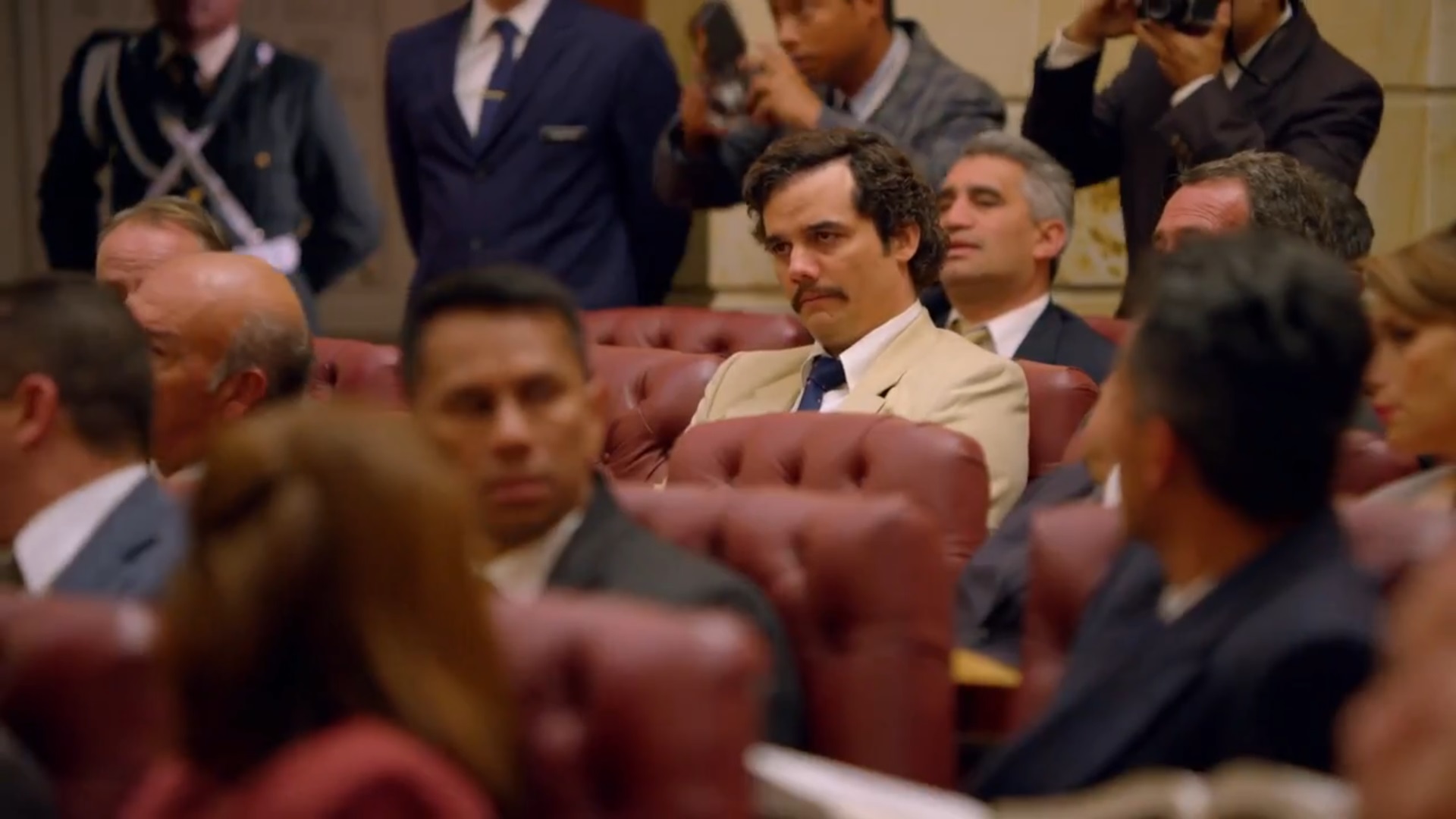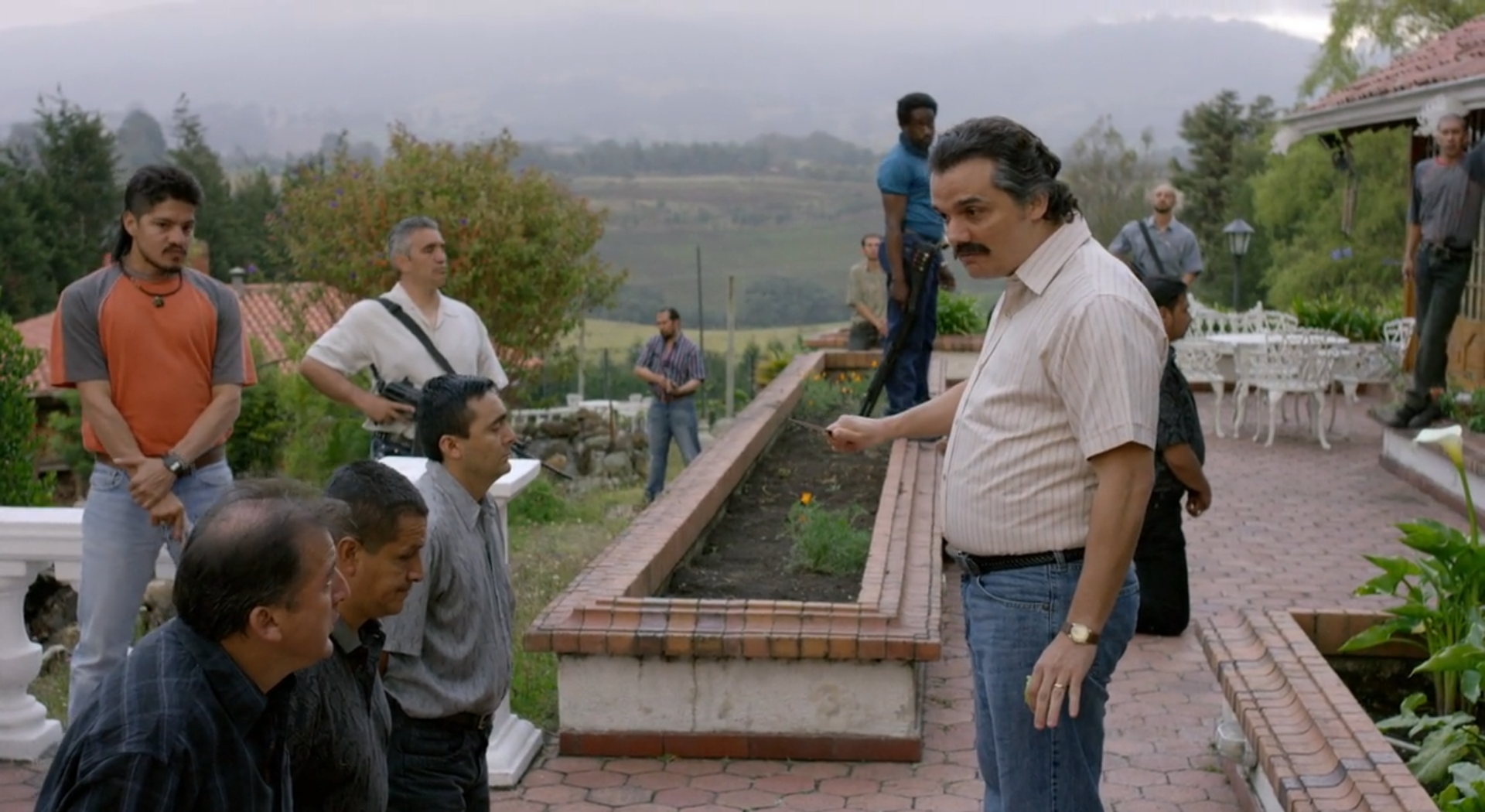Pablo Escobar
Our editors will review what you’ve submitted and determine whether to revise the article.
Pablo Escobar, in full Pablo Emilio Escobar Gaviria, (born December 1, 1949, Rionegro, Colombia—died December 2, 1993, Medellín), Colombian criminal who, as head of the Medellín cartel, was arguably the world’s most powerful drug trafficker in the 1980s and early ’90s.
Soon after his birth, Escobar’s family—his father was a farmer and his mother a schoolteacher—moved to Envigado, Colombia, a suburb of Medellín. While still a teenager, he began a life of crime. His early illegal activities included selling fake diplomas, smuggling stereo equipment, and stealing tombstones to resell. Escobar also stole cars, and it was this offense that resulted in his first arrest, in 1974. As the cocaine industry grew in Colombia—thanks in part to its proximity to Peru, Ecuador, and Bolivia, major growers of coca, from which cocaine is derived—Escobar became involved in drug smuggling. In the mid-1970s he helped found the crime organization that later became known as the Medellín cartel. His notable partners included the Ochoa brothers: Juan David, Jorge Luis, and Fabio. Escobar served as head of the organization, which focused largely on the production, transport, and sale of cocaine.
However, such philanthropic works were offset by Escobar’s well-known ruthlessness. He handled problems with “plata o plomo,” meaning “silver” (bribes) or “lead” (bullets). In addition to rival drug traffickers, notably in the Cali cartel, his victims included government officials, policemen, and civilians. In 1989 the cartel reportedly placed a bomb aboard an airplane in an attempt to kill an alleged informant. More than 100 people were killed. The threats of extradition to the United States—which, as the destination of most of the cartel’s drugs, had come to view Escobar as a top target in its war on drugs—drew even greater retaliation from Escobar, who reportedly said that he “would rather have a grave in Colombia than a jail cell in the U.S.”
Amid the growing bloodshed, a massive manhunt was undertaken to find Escobar, while the government also began negotiations for his surrender. In June 1991, on the same day that the Colombian Congress voted to forbid extradition in the country’s new constitution, Escobar surrendered and was subsequently jailed. His imprisonment, however, had little effect on his criminal activities and his lifestyle. He was allowed to build a luxurious prison, which became known as La Catedral. Not only did the facility include a nightclub, sauna, waterfall, and soccer field, it also had telephones, computers, and fax machines. However, after Escobar tortured and killed two cartel members at La Catedral, officials decided to move him to a less-accommodating prison. Before he could be transferred, Escobar escaped custody in July 1992. The Colombian government—reportedly aided by U.S. officials and rival drug traffickers—launched a manhunt. On December 2, 1993, Escobar celebrated his 44th birthday, allegedly enjoying cake, wine, and marijuana. The next day his hideout in Medellín was discovered. While Colombian forces stormed the building, Escobar and a bodyguard managed to get to the roof. A chase and gunfight ensued, and Escobar was fatally shot. Some, however, speculated that he took his own life. After he died, the Medellín cartel soon collapsed.
A larger-than-life figure, Escobar inspired numerous books, movies, and TV projects in the decades after his death.
Pablo Escobar
Pablo Escobar
Biographical Information
Full name
Nickname(s)
Paisa Robin Hood
El Padrino (The Godfather)
El Patrón (The Boss)
El Señor (The Lord)
El Mágico (The Magician)
El Pablito (Little Pablo)
El Zar de la Cocaína
Status
Birth
Death
Cause of death
Nationality
Fictional?
Career Information
Occupation
Affiliation
Years active
Personal Information
Gender
Spouse(s)
Children
Appearances
First
Episode count
Portrayed by
«Gentlemen. I’m going to tell you who I am. I am Pablo Emilio Escobar Gaviria. My eyes are everywhere. That means you guys can’t move a finger in all of Antioquia without me knowing about it. Do you understand? Not a finger.«
Pablo began his criminal career during his teenage years, and became a well-known smuggler by the 1970s. He began smuggling cocaine into the United States in 1973, and founded The Medellín cartel in 1976 by entering into an alliance with other Medellín-based smugglers. Using his drug wealth, he began engaging in social charity to cement his political career. He was elected as an alternate representative in the Chamber of Representatives, but his political career came to an abrupt end when he was outed as a drug trafficker.
After Escobar murdered two of lieutenants inside his prison, President Gaviria attempted to move him into a standard prison. Escobar refused, and held Eduardo Sandoval hostage in the prison, prompting the Colombian special forces to lay siege upon the prison, resulting in Escobar’s escape in 1992. Following his escape, a nation-wide manhunt was organized by the government. The Medellín cartel was also targeted by the Los Pepes, a paramilitary vigilante organization financed by the Cali cartel. The Medellín cartel crumbled by the middle of 1993; and Escobar was killed in action while attempting to defend himself from the Colombian police.
Escobar was one of the wealthiest drug traffickers, and left a controversial legacy in Colombia. While he is vilified for his terrorism campaign against the government, he was considered as a «Paisa Robin Hood» by many of Colombia’s poor.
Contents
Biography [ ]
Early life [ ]
Pablo Escobar was born on 1 December 1949 to farmer Abel de Jesús Escobar Echeverri and school teacher Hermilda Gaviria in the town of Rionegro. His parents separated a few years after his birth, and he moved to Medellín with his mother and cousin Gustavo Gaviria. Pablo took part in small-time criminal activities during his childhood to support his family.
Criminal career [ ]
Rise to prominence [ ]
Pablo and Gustavo continued their criminal activities throughout their adolescence, and established a smuggling operation in which they smuggled consumer electronics, cigarettes, alcohol and marijuana across Colombia. By 1973, his organization became one of Colombia’s three most powerful smuggling operations.
Starting the cocaine empire [ ]
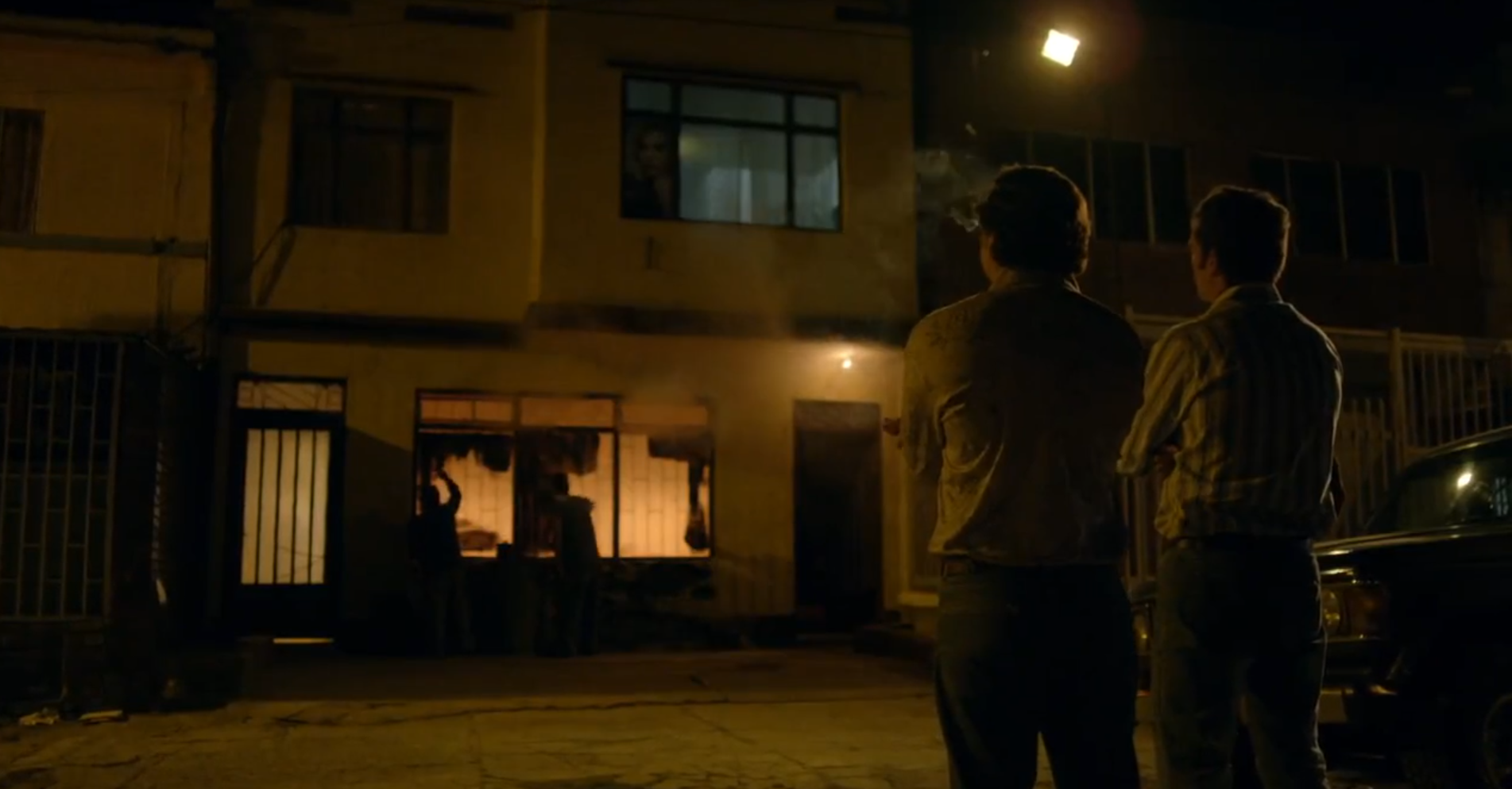
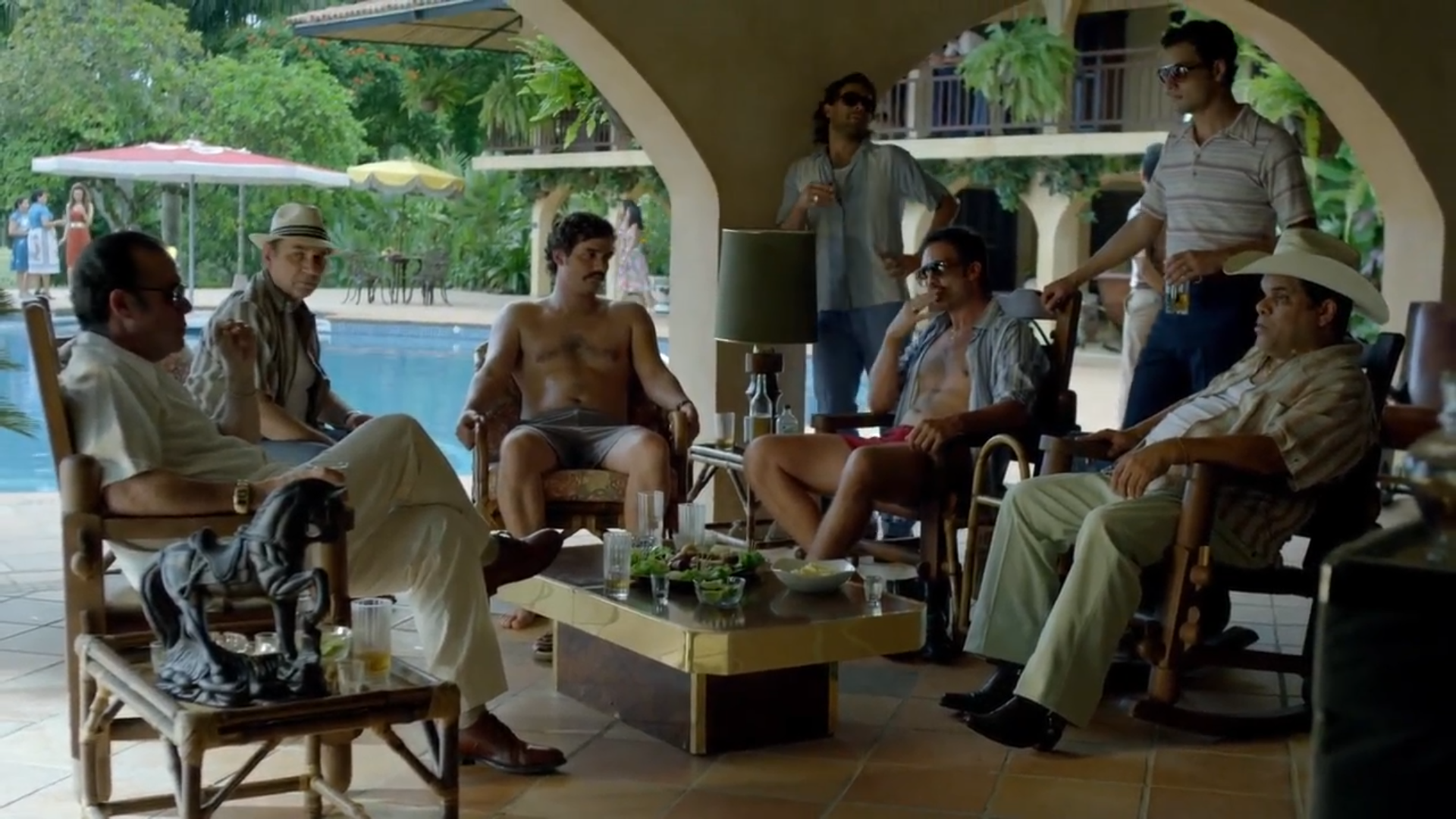
Escobar introducing other smugglers to the cocaine business.
Pablo’s success attracted the attention of other smugglers, including infamous emerald smuggler José Rodríguez Gacha and the Ochoa brothers: Jorge Luis and Fabio. Pablo called all smugglers together and invited them into the cocaine business to lower production, refining and smuggling costs. As per their agreement, Pablo would smuggle cocaine produced by the other smugglers to the United States, in exchange for 30% of the sales value.
However Cockroach was displeased at Pablo inviting more smugglers into his organization, and was indignant that he had to spend months living in a cocaine lab in the jungle while Escobar and Gaviria bought mansions for themselves.
With the flow of cocaine into Miami, the city became a hotbed of criminal activity. American businessmen feared that the cocaine would destroy the city’s formal economy, and urged US President Ronald Reagan to start a war on drugs. This led the DEA to send Murphy to investigate the drug trade.
Escobar hired journalist Valeria Velez to cultivate an image of the ‘Paisa Robin Hood’.
At some point in the early 1980s, Escobar met with Gilberto and Miguel Rodríguez Orejuela of the Cali cartel, a rival drug enterprise whereupon they came up in an agreement in which the Cali cartel would sell cocaine in New York City, while Miami would be held by the Medellin cartel.
A few years later, the Cali cartel grew up to be second-largest drug cartel in Colombia. After Mexican drug trafficker Miguel Ángel Félix Gallardo finalized an agreement in which he would smuggle cocaine through Mexico for the Cali cartel, Escobar had Blackie kidnap him and his associate Isabella Bautista. At the Hacienda Napoles, he introduced Félix to his hippos, heard his backstory and had him smuggle an equal amount of cocaine for the Medellin cartel too.
Political career [ ]
Pablo, after being revealed as a narcotrafficker by Justice Minister Rodrigo Lara.
With a large inflow of cash, Pablo decided to fulfill his lifelong ambition of becoming a politician. He also wanted to use his power to provide protection to his allies. In the Colombian general election in the early 1980s, he ran as alternative for former Congressman Jairo Ortega as a part of the New Liberalism party. Pablo hired lawyer Fernando Duque to donate massive amounts of money to the New Liberalism party to get them to overlook his drug career.
Escobar campaigned for Ortega across the poor districts of his electorates, and built schools, houses and hospitals for the poor. His men distributed money to the poor as bribes. This resulted in a landslide victory for Ortega, who immediately resigned from his post and appointed Escobar as his successor.
However, at his first parliamentary session, Justice Minister Rodrigo Lara Bonilla ousted Escobar as a drug trafficker by displaying Escobar’s 1976 mugshot to the entire room and claimed that the fortune he made from his taxi company was a lie. Escobar aggressively stared down Lara, and walked out of the hall. Lara did not stop there, and actively went after the cartel. He fined Escobar for the illegal importation of elephants, denied flying permits to 57 planes of the Ochoa brothers’ air fleet, and revealed that six of the country’s eight soccer teams were owned by narcotraffickers, prompting Gacha to give up ownership of Los Millonarios (The Millionaires). Escobar attempted to slander Lara, but his attempts were in vain, and he finally resigned from his post.
Escobar retaliated by ordering his men to assassinate Rodrigo Lara in August 1984.
Palace of Justice siege [ ]
The M-19 agreed to help Escobar.
Escobar was indicted for the murder of Rodrigo Lara Bonilla, and the Colombian government agreed to an extradition treaty with the United States for anyone related to narcotic trafficking charges. Escobar feared extradition the most, and formed Los Extraditables with his partners to fight extradition.
Escobar began buying off or scaring politicians to repeal the extradition treaty during the next elections, but was unable to do neither to Luis Carlos Galán. Pablo sent out hostile letters to politicians and judges, but his efforts were in vain; and ultimately resorted to violence by assassinating lawyers and judges; beginning his history of terrorism against government.
The DEA captured Barry Seal, an ex-CIA pilot who worked as a pilot for the cartel. Seal provided photographs which showed Pablo loading a plane full of cocaine along with Nicaraguan officials, who were a part of the left-wing Sandinista movement. When the narco-communist connection reached Washington D.C., the US government roped in the US Armed Forces and the CIA with the DEA’s fight against the cartel. Escobar responded by sending hitmen to assassinate Seal, who was hiding in Baton Rouge.

Pablo began recruiting children in hope for a possible war against the government.
While waiting for Gaviria’s response, Pablo began ordering the assassinations of judges, politicians, editors and journalists who opposed him. Escobar’s men began recruiting children from the slums to work as scouts, delivery boys and killers for the cartel. In the meantime, Colonel Horacio Carrillo began recruiting an army of incorruptible men to form the Search Bloc; the organization dedicated to bring Escobar down.
War against extradition [ ]
«Lies are necessary when the truth is difficult to believe. Right?» ― Escobar to Eduardo Sandoval, during his surrender.
Gaviria spoke in favor of extradition while addressing the foreign media; and Pablo officially began the war against the Colombian government. Pablo established a system in which his sicarios would be paid handsomely in exchange for killing police officers. Police officers were valued at 1 million pesos per head. The bounty system led to the death of over 200 police officers, which resulted in the police constructing a special morgue just to store the bodies.
Pablo hired Basque terrorist and explosives expert Efram Gonzalez to create a bomb which would be used to assassinate Gaviria, who was now the most popular presidential candidate. He began courting Jaime Carrera, a teenager from the slums, to be the bomber, and planned on bombing a commercial flight which Gaviria was scheduled to board. Jaime carried out the Avianca Flight 203 bombing, but unfortunately for Escobar, Gaviria did not board the plane as he was warned by the DEA. The bombing resulted in the death of 101 civilians (including Carrera, who did not know that he was on a bombing mission) and 6 crew members. The bombing led to an international outcry against narcotraffickers.
Navegante, Gacha’s head of security, and secretly a mole planted by the Cali cartel; provided Gacha’s location to the DEA, which resulted in the Colombian Nation Police killing him and his son Fredy Rodriguez Celades on 15 December, 1989 in Caratagena.
The bombing created a wave of support for Gaviria, who won the elections by a landslide in 1990. Upon assuming Presidency, Gaviria let the Search Bloc, led by Colonel Horacio Carrillo loose. Despite Carrillo mounting numerous raids, Escobar managed to slip away thanks to his army of informants. Escobar retaliated with a devastating bombing campaign which resulted in thousands of civilian deaths.

Pablo Escobar meeting Hélmer Herrera in 1989
With a government sanction operation against Escobar, the Cali cartel began selling their cocaine in Los Angeles, violating a previous agreement with Escobar. Escobar, Gustavo, Fernando Galeano and Gerardo Moncada met with Pacho Herrera, one of the four leaders of the Cali cartel to resolve the dispute. Pacho reiterates that both cartels would remain allied in the war against extradition, and the issue over Los Angeles would be looked after once Escobar resolves his conflict against the state. Escobar found Pacho arrogant and gave off a thinly veiled death threat.
Escobar send Duque to negotiate a surrender deal with Gaviria in exchange for the bombings to stop. Duque however, began questioning Escobar’s methods, and upon Gaviria’s insistence, lied about the government seeking a surrender deal in exchange for the bombings to stop, giving more time for Carrillo to track down Escobar.
Escobar wanted to continue the bombing, but Gustavo convinced him to instead bring terror to people who mattered the most to the government: children of politicians and businessmen. Pablo ordered his men to kidnap the children of Colombia’s elite, one of them being Diana Turbay, a highly popular news anchor, daughter of former President Julio César Turbay Ayala and Valeria Velez’s fiercest competitors.
When President Gaviria refused to bend, Escobar ordered Poison to kill Ofelia Hernandez, a wealthy heiress. Escobar knew that Diana’s father would put immense pressure on Gaviria; so he decided make a hostage film with Diana. Diana agreed to it after she made Escobar free one of the hostages. When former President Turbay threatened to rob Gaviria of his support at the assemblies and pull back financial donors, Gaviria caved in and agreed to negotiate with Duque. Concurrently, he also authorized the CIA to put their surveillance planes on the air to track down Escobar.
Escobar came to know of the Search Bloc operations and began setting up traps to distract them. He later had Diana shoot another video, in exchange for releasing two more hostages. When she asked why Escobar was a violent terrorist, he replied that it was because of people like her father, who couldn’t tolerate a rural peasant who was more richer and more intelligent than them. In her next video, she warned Gaviria that if he continued his co-operation with the Americans, Escobar would kill every hostage. Despite this, Gaviria continued to allow the Americans to intercept radio signals.
The CIA located Gorilla, one of Escobar’s sicarios who guarded Diana. After they triangulated the coordinates, they had Carrillo mount a rescue operation. However, Diana was accidentally shot and killed by Carrillo during the raid. Diana’s death devastated everyone in Colombia, from the rich to the poor. Outmanoeuvred, Gaviria agreed to Escobar’s demands.
Meanwhile, Valeria unwittingly reveals the location of Escobar’s hideout at the Monaco building to Pacho Herrera. Both the Colombian police and the Cali cartel planned on getting Escobar before he officially surrendered. While Carrillo mounted an army of vigilantes, Herrera decided to bomb the Monaco building. However, Escobar survived the attack. The bombing caused Escobar’s daughter Manuela to turn permanently deaf on one ear.
Pacho also spilled the beans on Marina’s affair with Gustavo to the Ochoa brothers. The Ochoa brothers, while initially angry, decide to ignore the matter and planned on coming up with a surrender deal similar to Escobar’s. However, Pacho played the brothers into believing that Escobar was going to betray them once he went inside the jail. The brothers decided to give away to location of Gustavo to General Jaramillo in exchange for a surrender deal. With the help of the Cali cartel, the Ochoa brothers signed their own treaty with the government. They received reduced sentences for illegally importing bulls from Spain. Acting on the Ochoa brothers’ information, Colonel Carrillo led a squad of off-duty men and arrested him while he was at a hotel with Marina. The vigilante cops, led by Carrillo, took Gustavo to an abandoned building, and tortured him to extract Escobar’s location. When Gaviria refused, Carrillo and his cops, all of whom had lost several family members due to Escobar’s terrorism campaign, took turns torturing Gaviria. Carrillo finally ended the torture session by shooting Gaviria in the head, and then subsequently fired several other shots into his body to make it appear that he was killed in a shoot-out, and dumped his body on the outskirts of Sabaneta.
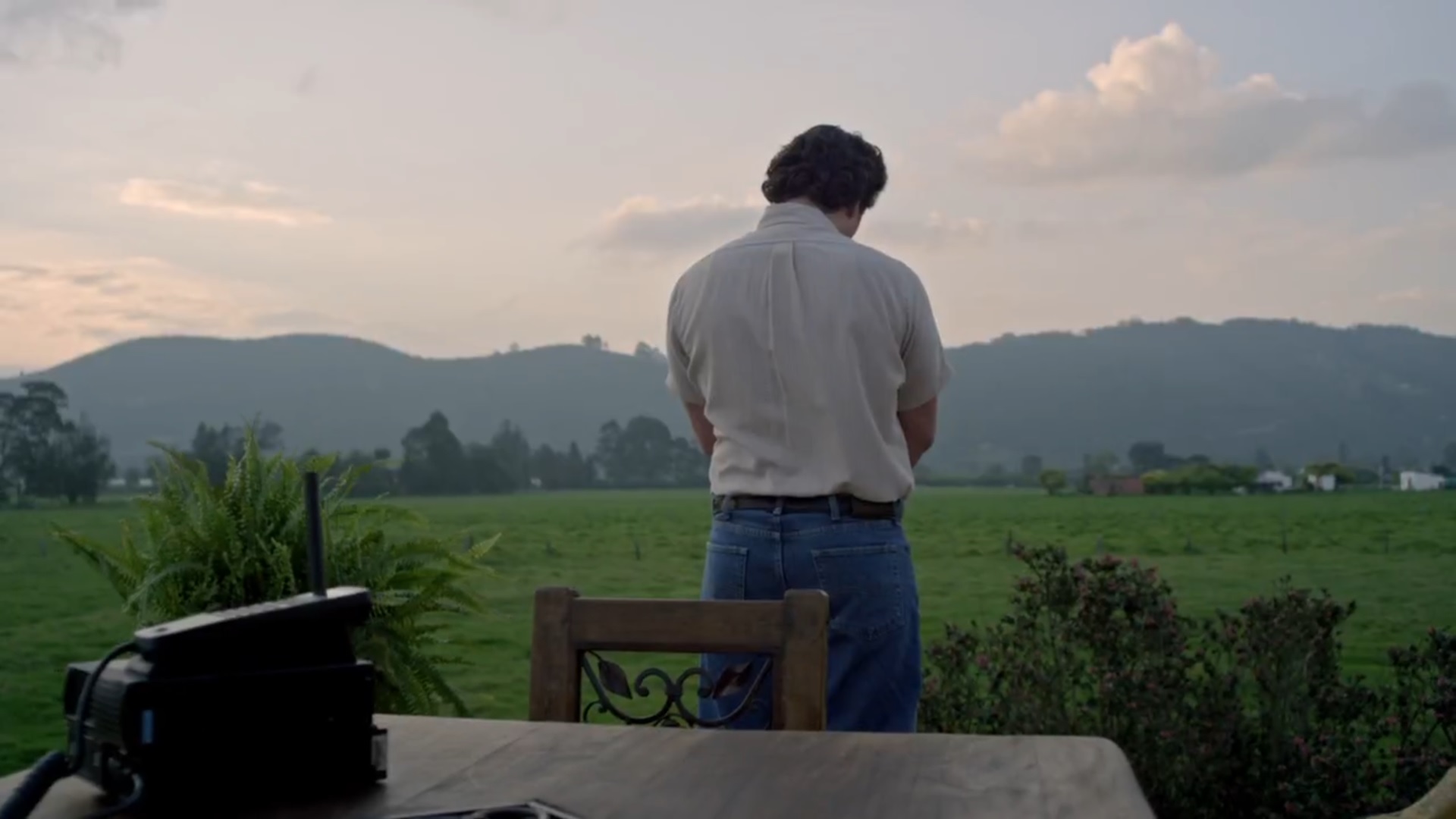
Escobar listening to Gustavo’s funeral over the radio.
Escobar was deeply shocked by Gustavo’s death. Valeria visited him, and told him that the Ochoa brothers were spotted at Cali before their surrender, and said that they sold out Gaviria to the government. When Escobar asked whom did they meet, she responded with Pacho Herrera. Escobar ordered an attack on Pacho while he was playing soccer, but unfortunately, despite killing 14 men affiliated to the Cali cartel, Escobar’s sicarios were unable to kill Herrera, who had escaped. Escobar then remotely listened to his cousin’s funeral through the radio, and vowed vengeance against the Cali cartel.
Hours after the parliament voted to repeal the extradition treaty, a military helicopter was dispatched to Escobar’s hideout, where he officially surrendered to Eduardo Sandoval. He was taken by helicopter to his private prison.
La Catedral [ ]
Escobar and his sicarios moved into the La Catedral, the private prison fortress. The military guarding a 3 kilometre radius around the prison were corrupted by the cartel, which allowed Paisa to drive in with trucks carrying Escobar’s requested items, including gambling equipment, women, lobsters and weapons. However despite this, prison life bored Escobar and he began making a scrapbook of his life.
While celebrating his birthday with his family inside the prison, he heard Judy, Gerardo’s wife, complaining about the war tax imposed on her husband. Later, Pablo was violently tackled by Arete while playing a soccer math. Pablo began to feel that he was losing respect among his employees.

Pablo questions Moncada and Galeano.
Pablo realized this, and just as Galeano and Moncada were about to get onto El Paisa’s truck, Pablo grabbed a pool cue and violently attacked Galeano from behind, bludgeoning him to death. Blackie and Velasco quickly grabbed Moncada and dragged him away, as he cursed Escobar. Blackie and Velasco killed Moncada, and burnt their budies using a cremator inside the complex, and threw a barbeque to hide the smell.
Rumors of Kiko and Galeano’s deaths began to spread. The Cali cartel spread the rumor to the DEA, who corroborated with photographs taken from Paisa’s truck. In order to cause further chaos, DEA agents Murphy and Javier Peña send the photographs to the El Espectador newspaper. After the photos were published, it caused a political storm in Colombia, and President Gaviria decided to move Escobar to a conventional prison.
Escobar refused to move, prompting Gaviria to send in the Military to lay siege upon the prison on 22 July, 1992. Escobar demanded a re-negotiation, fearing that he would be extradited to America if he left his prison. Gaviria sent Sandoval to the prison complex to negotiate with Escobar. Despite Gaviria instructing the Army to arrest Escobar, Sandoval realized that the Army had done no such thing, and voluntarily went inside the prison all by himself.
Escobar used the opportunity to hold Sandoval hostage, and forced him to talk to Gaviria through a prison telephone. Sandoval successfully managed to inform Gaviria about his kidnapping, without Escobar knowing about it. Gaviria relieved Brigadier General Ariza off command, and authorized a Army Special Forces raid on the prison. The Army stormed the prison with 250 Special Forces operatives, and fought a long gun battle with Escobar’s sicarios, and successfully extracted Sandoval. However, Escobar managed to escape the prison using his influence. A band of Colombian soldiers attempted to stop him, but let him walk off because of his infamy.
Return to Medellín [ ]
Escobar interrogates Judy’s men.
Gerardo Moncada’s wife, Judy, broke away from the cartel in retaliation for her husband’s murder, along with her brother Jaime Mendoza and the Medellín cartel’s head of security Don Berna. However, other high ranking members like Ricardo Prisco of the Prisco gang and the Gallon gang remained loyal to Escobar.
Quica hired taxi-driver El Limón, a resident of one of the barrios constructed by Escobar, to be Escobar’s chauffer. El Limón agreed to chauffer Pablo around Medellín, while Pablo hid in his taxi’s trunk. In order to make it look more legitimate, he hired his classmate Maritza to act as the taxi passenger. Escobar also re-established his network of using children as spotters.
Pablo met Rojas, one of his accountants, and heard from him that Judy Moncada was on talks with rival drug traffickers. With the help of Ricardo, Pablo raided Jaime Mendoza’s lab, and shot him in the head as a warning for Judy.
Despite this, Colombia’s Attorney-General Gustavo de Greiff Restrepo met with Duque and was willing to negotiate a surrender deal with Escobar. Meanwhile, the Americans had tracked down Pablo’s hideout while following an imported gold-embellished toilet, and mounted a raid. Pablo and his family escaped, but after being driven out of his home again, Pablo swore to engage in another war with the government. He brought back the bounty system and sent his sicarios to the city to indiscriminately kill police officers.
The wave of violence led Colonel Pinzón to resign as the leader of the Seach Bloc, and President Gaviria re-appointed Colonel Carrillo, who was exiled to Spain after Escobar’s surrender, to succeed him. Immediately after Carrillo’s return, he took a large convoy of cops to the centre of Escobar’s barrios, and urinated onto one of Escobar’s murals. Escobar saw it as an act of intimidation, failing to realize that Carrillo did it in order to locate Escobar’s network of spotters.
Pablo’s men attacked Judy’s mansion, and Pablo personally questioned her bodyguards about her whereabouts, but received no response.
Meanwhile, a Search Bloc raid led by Carrillo eliminated most of the Prisco gang, except leader and Escobar’s physician Ricardo. The Search Bloc under Carrillo went hard on Escobar’s organization. Using information supplied by Don Berna and Judy, the Search Bloc raided several of Escobar’s laboratories. Carrillo even threw Gato, Escobar’s sicario who managed a drug lab out of a helicopter when he refused to rat on Pablo.
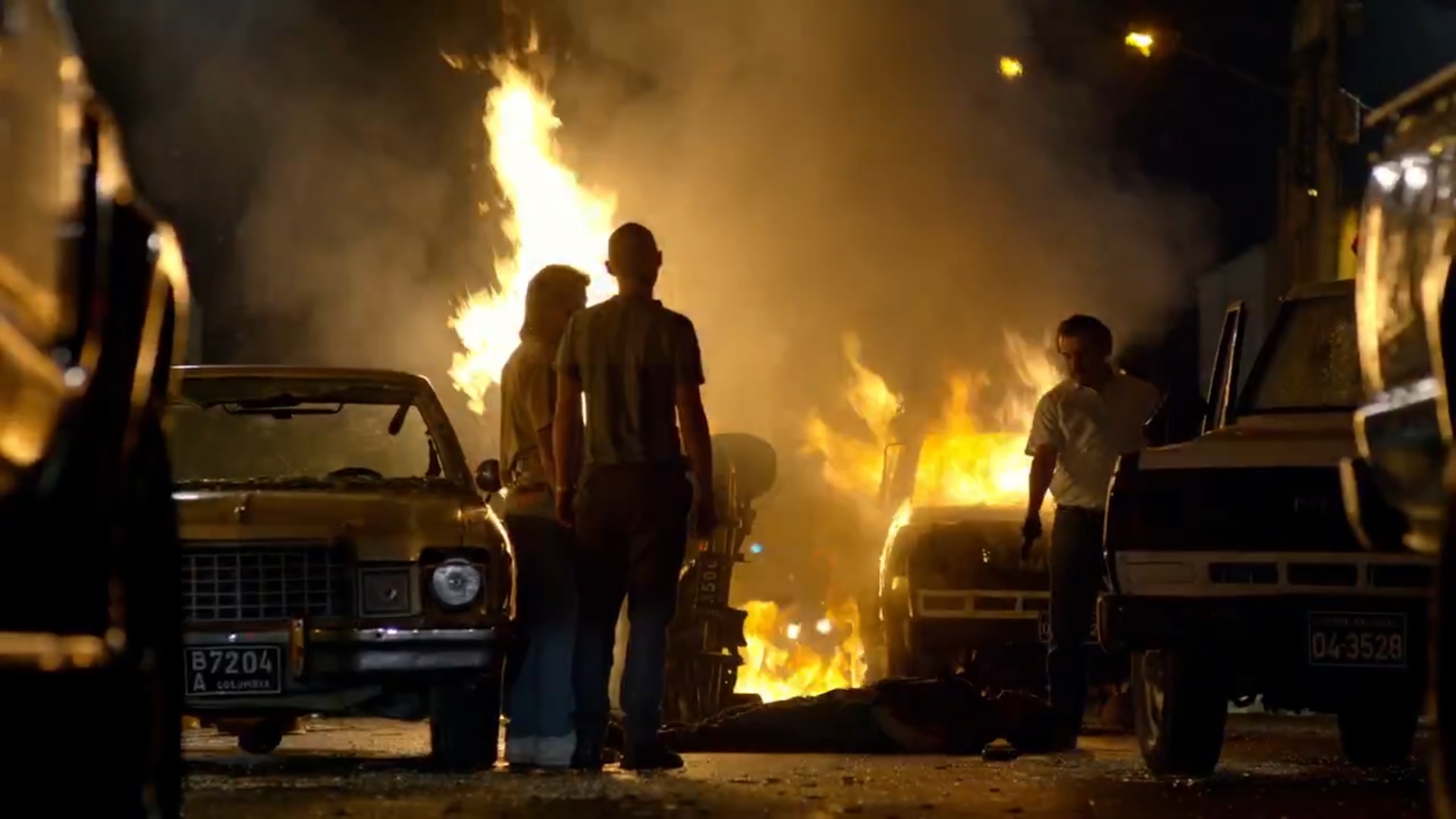
Escobar executes Colonel Carrillo
Deciding that the only way to feel safe was to have Carrillo killed, Escobar had Limón use Maritza as a bait to lure Carrillo. Limón had Maritza approach the DEA, and she agreed to give away Escobar’s location in exchange for protection. Javier Peña, the DEA agent, passed on the information to Carrillo, who mounted a big convoy and drove to the location given to them by Maritza. One the way, Escobar and his sicarios ambushed the convoy, killing most of the police officers. Carrillo, who was mortally wounded, crawled out of his car and collapsed to the ground. Escobar walked over towards him, and shot him with the bullet he gave to the kid. Escobar proceeded to unload an entire pistol magazine on Carrillo in retaliation for Gustavo’s murder. Escobar later met Maritza, and thanked her for her help by giving her a duffel bag full of US Dollars.
Carrillo’s death shook everyone in Colombia, especially the Cali cartel, whose leadership hoped that Carrillo would’ve brought an end to Escobar. The Search Bloc was on a standstill as no Colombian police officer wanted to succeed Carrillo.
Collapse of the Medellín cartel [ ]
In order to cheer his wife, Escobar facilitated the arrival of his brother-in-law Carlos Henao from Miami. Carlos informed him that Escobar’s war with the government after his escape from prison did not hinder their operations, and they were making more money than ever. Escobar wanted his business to grow further, and told his sicarios to call The Lion back to Colombia.
Meanwhile, CIA representative Bill Stechner convinced Carlos Castaño of the AUC right-wing paramilitary group to go after Escobar. Carlos Castaño, and his brother Fidel Castaño resented Escobar due to his collaboration with the M-19 during the Palace of Justice siege; and agreed to shift their operations from the jungle to the city to hunt down Escobar. The brothers met with Herrera and Judy to form a partnership, but Herrera declined, stating that the brother’s operations would risk the secrecy of the Cali cartel. Judy, however, decided to work with the brothers, and had Don Berna, who had previously co-operated with DEA agent Javier Peña under her orders, convince Peña to join their organization, called Los Pepes.
While Javier Peña was reluctant at first, he agreed to work after he was dismayed by the inefficiency of the Search Bloc following Carrillo’s death. With the help of Maritza, he followed Limón to one of the cartel’s safehouses. He saw Velasco there, and called the Search Bloc for backup, however, his request was denied, so he called Berna instead, and Los Pepes arrived at the location and successfully captured Velasco. Berna tortured Velasco, and obtained the location of three of Escobar’s accountants, and also the fact that Lion was returning to Colombia.
Judy gave the information to Gilberto, who sent Navegante to whisk away Lion at the airport. Lion agreed to betray Escobar and work with the Cali cartel. He later lied to Blackie that he got spooked and took a flight back to Miami. Lion began to reveal Pablo’s operations in Miami to Pacho Herrera.
Impressed by the AUC’s tactics, Peña began illegally sharing intelligence gathered by the Search Bloc to the Los Pepes. The Los Pepes functioned as a death squad, and killed dozens of Pablo’s sicarios, and numerous civilians.
Ricardo Prisco, the leader of the Prisco brothers, escaped an attempt on his life by the Los Pepes, and succeeded in injuring one. He had his men admit him in one of the hospitals, and using his doctor privileges, tortured the man to death, and found out that the Los Pepes were affiliated to the AUC.

Escobar decides to go to war again with the Cali cartel
Escobar was unsure as to why the AUC would leave the jungle and come after him, and concluded that Judy Moncada was behind it. Later, a garage housing Escobar’s car collection was burned down. Escobar concluded that Judy did not have the funds to finance such an operation, and deduced the Cali cartel had a role in the Los Pepes.
Escobar then bombed the wedding of Gilberto’s daughter Marta Rodríguez. Despite numerous casualities, the leaders of the Cali cartel survived, along with the bridge and groom. Enraged that Escobar went after his family, Gilberto vowed revenge against Escobar, and officially sanctioned funding to the Los Pepes.
Unable to strike back at the Cali cartel, Escobar began bombing their chain of pharmacy stores, killing several innocent bystanders in the process. Concurrently, Escobar also began going after the government as he felt that they held double standards as they did not condemn the Los Pepes.
In 1993, Escobar decided that Colombia wasn’t safe for his family, and sent them to Germany, which relaxed it’s immigration laws following the collapse of the Berlin wall. Fernando Duque is killed by the Los Pepes, along with his young son, his wife and her mother. The stress began taking a toll of Pablo’s physical health, with frequent headaches plaguing him.
The DEA prevented Escobar’s family from entering Germany. Their visas are revoked, and they were forced to return to Colombia. Just immediately outside the Bogotá airport, they were taken by armed personnel of the Attorney-General’s Office, and were housed at a hotel in the city. Escobar sent Blackie to spy on them. Despite not seeing anything, Blackie tells Escobar that the family is doing fine. Blackie is eventually nabbed by the police while in Bogotá.
Escobar’s resentment towards President Gaviria for not condemning the Los Pepes grew. He had Blackie load up 220 pounds of TNT inside a car, and explode it outside a shopping district in the Downtown Bogotá close to the Presidential Palace. The latest terror attack completely turned the public against Escobar. Despite the Attorney-General pleading Escobar to unconditionally surrender, Escobar refused, saying that he would only negotiate when his family is safely taken outside Colombia.
The Gallon gang, a gang of drug traffickers who were allied to Escobar, quickly switched loyalty to the Los Pepes after Judy paid them a visit. The Los Pepes also began running advertisements in local newspapers calling all drug traffickers to side with them against Escobar.
Pablo found out from Quica that the Los Pepes planned a meeting with all other drug traffickers at Judy’s mansion in Montecasino. Escobar planned on attacking the meeting, but Rojas informed him that they were strapped on cash as shipments from Miami did not reach them properly as they used to. This was due to the Lion defecting to the Cali cartel, which Escobar did not know at that point. After the Cali cartel’s silent coup was successful, Pacho had Navegante kill The Lion.
With political pressure mounting on Gaviria due to the upcoming elections, the President allowed to free Escobar’s family and began negotiations on finding asylum for them. Escobar had Valeria Velez deliver a satellite phone inside a suitcase to Escobar’s family. However, the Los Pepes found out and killed Velez and her entire news crew.
Gaviria changed his mind and refused the Escobar family to seek asylum. Enraged, Escobar decided to enter a massive battle with the Los Pepes at Montecasino to eliminate them once and for all. However, Quica grew increasingly anxious about associating himself with Escobar. The DEA began calling Quica in order to pin-point his location. Quica then proceeded to kill Ricardo and Rojas, and fled with the last of Escobar’s money, but he is nabbed by the DEA following a car chase through the city.
Threatened with a snitch tag, Quica agreed to rat out on the staging point for Escobar’s raid on Montecasino. Quica later called Escobar through the radio in an attempt to talk to him, but Escobar deduced that Quica was under American custody, and ordered his last loyal sicario Limón to leave for his father’s ranch in the countryside.
The CNP, who were observing the staging point for the raid hoping that Escobar would arrive, grew tired, and eliminated the last batch of Escobar’s gunmen, effectively terminating the cartel.
Final days and death [ ]
Escobar reunited with his father after decades. Despite having contempt for his son’s occupation, Abel allowed Pablo and Limón to live and work at his ranch. Escobar laid low at his father’s farm throughout the middle of 1993, engaging in farm work. de Greiff was no longer able to protect Escobar’s rights, and President Gaviria increased the bounty on Escobar’s head.
One day, while attempting to slaughter a pig, Escobar got blood all over him, and let out a sleuth of profanities, prompting his father to snap. Abel berated his son for being a vile, murderous criminal. Escobar replied by saying that his actions gained him infamy, and that even the American President knows about the Escobar surname. He also scolded his father for not having a single photograph of his children or grandchildren, and chided him for living like an insignificant hermit.
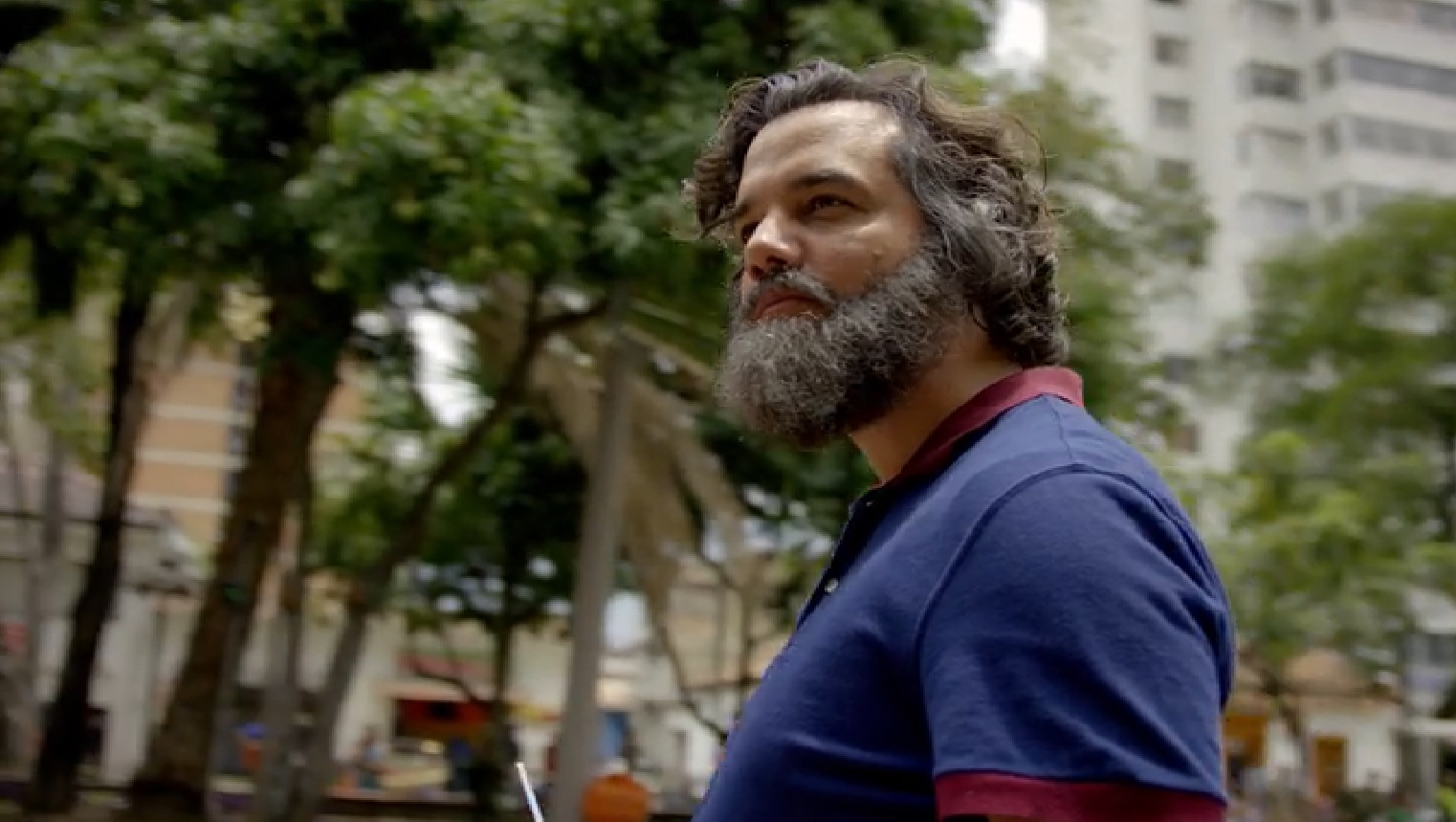
Escobar enjoying Medellín for the very last time.
Escobar and Limón began staying in a run-down two-storey building at Los Olivios, a quite middle class neighbourhood of the city. Limón would occasionally venture out in his taxi to purchase food, and Escobar stayed inside, in constant communication with his family. One day, Escobar ventured out, and enjoyed a cup of ice cream at the tourist district, and had a hallucination about his cousin Gustavo, who scolded him for his actions.
On 1 December 1993, Escobar celebrated his 44th birthday with his family through radio contact. However, he was unaware that his signals were triangulated by the Search Bloc. The very next day, while speaking to his wife, his safehouse is raided by the CNP and the DEA. Escobar and Limón put up a fight, and attempt to flee through the roof. Limón was shot dead, and Escobar began to make a run for it, but was shot by a CNP sniper. As he laid down on the roof-top, CNP officer Trujilo executed Escobar, while yelling «For Colombia!». The CNP and DEA Agent Steve Murphy posed over Escobar’s dead body. Escobar suffered gunshots to the leg and torso, and a fatal gunshot through the ear.
Escobar’s mother hurried to his body after news of his death began to spread, and still claimed that his son was innocent when she cried over his body.
Aftermath [ ]
Escobar’s funeral saw the attendance of over 25,000 people, mainly from the slums of Medellín. Escobar’s labs were either destroyed or taken over by rival traffickers. His properties were seized by the government, and several of them, were turned into tourist destinations.
The international cocaine market was then taken over by his rivals, the Cali cartel. However, their dominance was short-lived, and they were taken down two years later in 1995. After that, the Colombian drug cartels moved back to the underground, and the cocaine market was then dominated by Mexican drug cartels such as the Sinaloa and Gulf cartels.
Don Berna took over the drug trade in Medellín, creating the Oficina de Envigado out of the remnants of the Los Pepes and the Medellín cartel. The void left by Escobar’s death and Judy Moncada’s flight to the United States allowed the Castaño brothers to enter the drug trafficking market.
Personality [ ]
While briefing Miguel Ángel Félix Gallardo on the Colombiand drug cartels, Juan Matta-Ballesteros tells him that Escobar is a very temperamental and highly emotional individual. Escobar was extremely loyal to his family. Despite cheating on his wife with Valeria, he placed utmost priority on his wife’s safety, and even trained her on gun combat and fought extensively for her to get asylum in another country.


